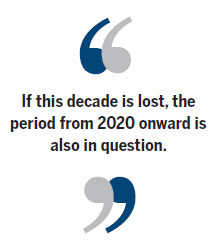Rich countries should honor climate vows
Updated: 2015-12-11 08:18
By Fu Jing(China Daily Europe)
|
|||||||||||
Six years on, the promises made at Copenhagen have not been met
The highly anticipated climate talks in Paris are inching their way toward an "ambitious" agreement on the global carbon budget from 2020 onward. A deal is expected to be clinched on Dec 11, after two weeks of bargaining mainly between the world's poorest countries and the richest.
No matter how ambitious the final outcome is, there is a danger that the developed economies are faced with a "lost decade" in terms of failing to deliver on their climate promises for the poor countries.
This inconvenient conclusion can be drawn from the 50-page agreement drafted by the negotiators in Paris. Reading through the text, there is no mention on how rich countries will fulfill their promises of funding support and technology transfer by 2020 to boost the capacities of developing countries to fight climate change.
Many may say the ongoing talks deal with the climate challenge after 2020, and it is understandable that the implementation of the old agreement is not part of the accord.

But when we aim further and higher, we need to assess what we have achieved previously. If we could not reach the goals we agreed before, there will be doubts about whether we can achieve the ambitious new goals.
Let us look at the goals first. In the Copenhagen Accord, which more than 140 countries including the United States, Japan and China as well as European powers signed in 2009, the developed economies made two funding commitments.
First, they committed to offering "new and additional resources", amounting to $30 billion, from 2010 to 2012 to help poor countries fight climate change.
Additionally, they committed to a goal of jointly mobilizing $100 billion a year by 2020 to address the needs of developing countries.
Six years after Copenhagen, these promises have not been met. Some argue that the developed economies are in difficulties. But when they made their promises they were being battered by the global financial crisis. Since then, the developed economies have gradually pulled themselves out of recession. Is $100 billion an impossible amount for them to provide? No.
Former World Bank chief economist Nicolas Stern in his famous 2008 climate report urged rich countries to allocate $130 billion a year in their budgets to help poorer countries fight climate change.
This figure was reduced to $100 billion by then British prime minister Gordon Brown. The then US secretary of state, Hillary Clinton, also raised the proposal of $100 billion in both public and private funding at Copenhagen.
So, it is evident that such a sum is feasible.

Yet we are halfway through the 2010 to 2020 period and the accounts of developing countries have received almost no money. The Green Climate Fund, which was set up by the 194 governments party to the UN Framework Convention on Climate Change, said it received pledges equivalent to about $10 billion last year.
At the negotiation table in Paris, the rich countries have put pressure on China and other developing countries, saying if they commit funding they will scale up.
But this is unreasonable. The basic fact is that the carbon emissions that are causing global warming are still attributed to rich countries due to their historic accumulations since the industrial revolution.
So transferring a small amount of their economic output to poorer countries to help develop clean solutions is their responsibility in helping to clean up our shared home.
However, what remains in the heart is that the global governance will only be efficient and trusted if all members of the international community keep their word. If this decade is lost, the period from 2020 onward is also in question.
The author is China Daily's chief correspondent in Brussels. Contact the writer at fujing@chinadaily.com.cn
(China Daily European Weekly 12/11/2015 page11)
Today's Top News
Putin, Cameron discuss Syria crisis, anti-terror fight
11 children drown at sea
Unregistered citizens to finally gain recognition
Aging population could shrink workforce by 10%
China seeks advice of foreign experts on economic blueprint
Aging population could shrink workforce by 10% in China
Czech president warns of terrorist attack
EU members agree on bloc's first cyber-security law
Hot Topics
Lunar probe , China growth forecasts, Emission rules get tougher, China seen through 'colored lens', International board,
Editor's Picks

|

|

|

|

|

|






